

Find out what your peers are saying about Broadcom, Microsoft, Proxmox and others in Server Virtualization Software.
| Product | Market Share (%) |
|---|---|
| VMware vSphere | 18.9% |
| OpenVZ | 0.6% |
| Other | 80.5% |
| Company Size | Count |
|---|---|
| Small Business | 175 |
| Midsize Enterprise | 137 |
| Large Enterprise | 259 |
VMware vSphere offers robust virtualization capabilities with features that enhance data center performance and optimize workloads. Centralized management and ease of deployment make it a cost-effective choice for many industries.
VMware vSphere is recognized for its high availability, vMotion, and Distributed Resource Scheduler, essential for efficient server infrastructure management. Users value its virtual machine management, seamless live migration, and strong resource allocation across data centers. Though the web client can be slow, and individual management of multiple ESXi hosts is challenging without central management, vSphere remains popular due to its flexibility and integration capabilities. While fault tolerance and free version features have their limitations, the product supports private clouds and hybrid cloud deployments effectively.
What are the key features of VMware vSphere?VMware vSphere is widely used in industries to manage server infrastructure effectively, hosting mission-critical applications like ERP and SQL servers. It supports development, testing, and backup environments, contributing to data center consolidation and cost reduction while enabling private and hybrid cloud setups.
We monitor all Server Virtualization Software reviews to prevent fraudulent reviews and keep review quality high. We do not post reviews by company employees or direct competitors. We validate each review for authenticity via cross-reference with LinkedIn, and personal follow-up with the reviewer when necessary.